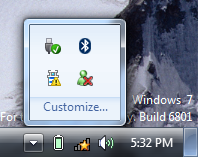How many Windows 7s will there be?

The internet has been awash with rumours about Windows 7, with a pre-beta release being handed out to attendees at the Professional Developers Conference in the US this week. But how many Windows 7 versions will there be?

(Credit: Microsoft)
While screenshots are available displaying some of the features of Windows 7, for me questions remain about two key issues — versioning and pricing. One of the key differentiators between Windows XP and Windows Vista was the proliferation of editions available.
When first released, Windows XP came out with two on-the-shelf editions; XP Home Edition and XP Professional Edition. XP Pro contained all the functions available in the OS. This presented neither an ambiguous distinction nor a difficult choice.
Compare this to Vista, which came out with four shelf editions: Home basic, Home Premium, Business and Ultimate. While not on shelves, there are also two other editions available, Windows Starter (for emerging markets), and Windows Enterprise (for enterprise desktops).
Microsoft may argue that this presents consumers with more choice, but I find this difficult to accept. Firstly, because businesses that only need a very basic OS are generally unable to get Home Basic on a business PC from large vendors. Secondly, those who forked out the extra cash for Vista Business gained extra features, but also lost features, as Windows Media Centre and the DVD burning software was stripped from Vista Business.
Finally, valuable features such as BitLocker were only available in the Ultimate Edition, meaning most businesses that did fork out to upgrade to Vista Business still only received a limited version of the OS, unless they paid the premium price.
Ultimately, I think Microsoft's move was about profit. By fragmenting its OS and then selling at different price points for different market segments, Microsoft was able to maximise volume by supply and demand.
This leaves two choices for Windows 7. Microsoft can continue with its fragmentation of its OS (Basic Home Basic? Semi-Ultimate?), or the company can return to a couple of editions or even just the one. This would give consumers and businesses that fork out for an upgrade all the bell and whistles available in the Windows 7. I know which option I prefer, what do you want to see?